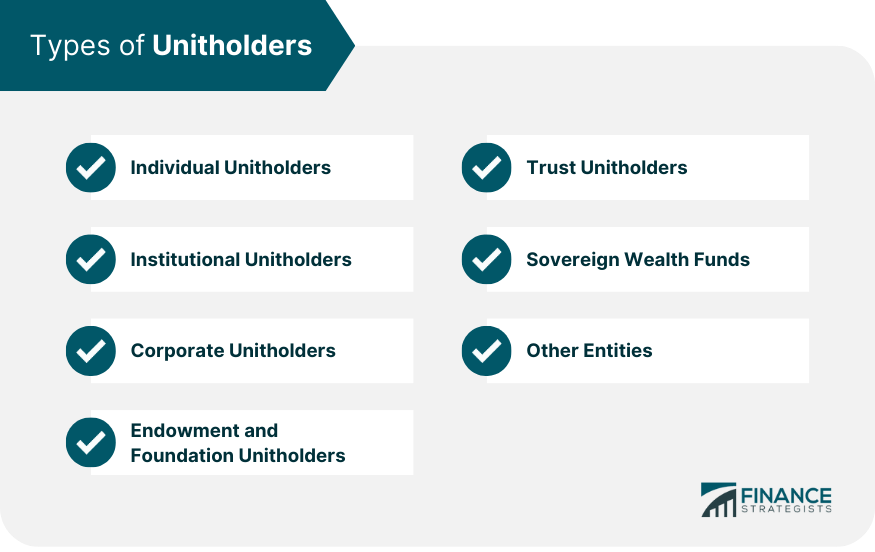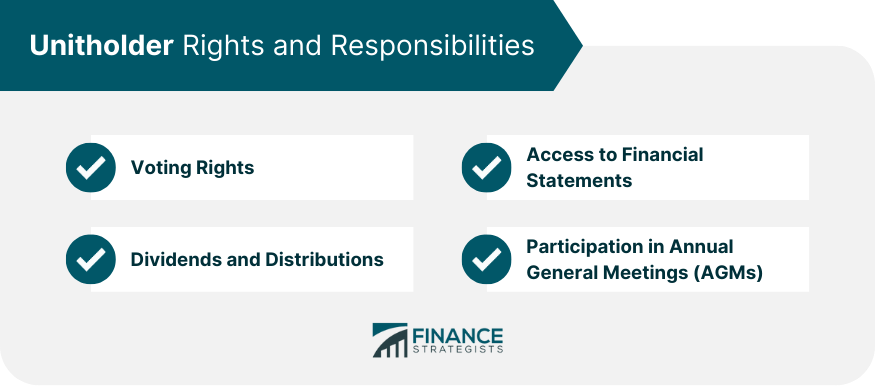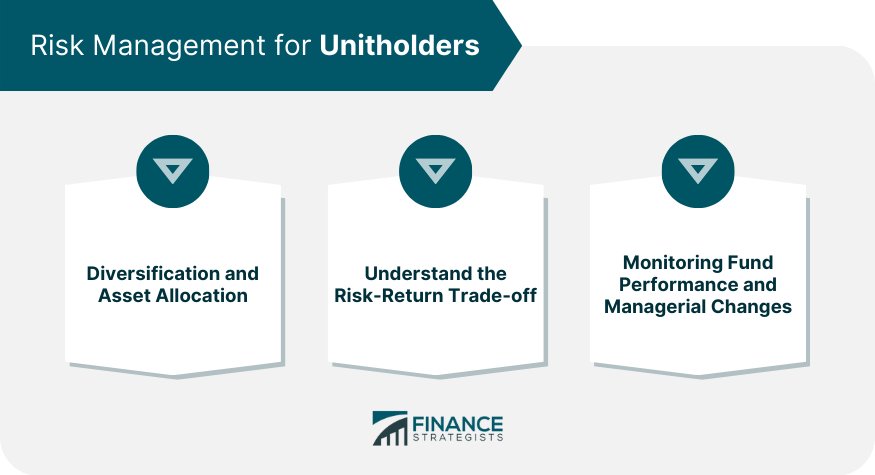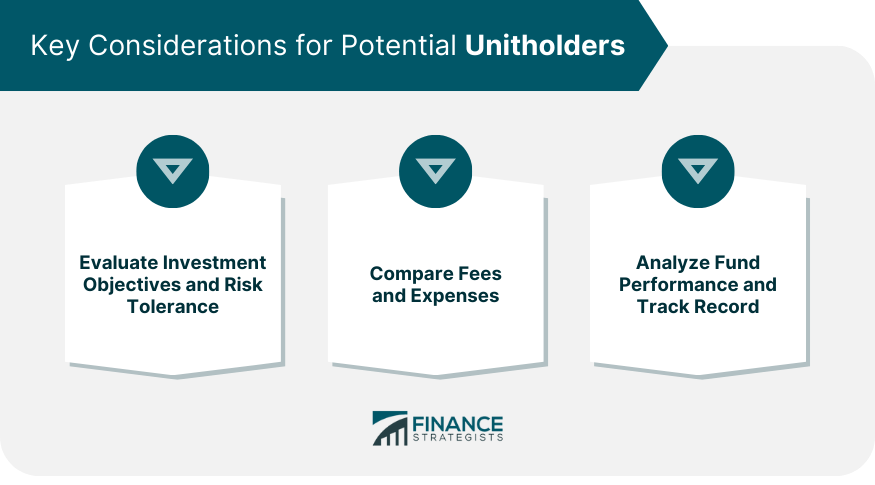A unitholder refers to an individual or entity that owns units in a unitized investment vehicle, such as a mutual fund, exchange-traded fund (ETF), or unit trust. Unitholders are the beneficial owners of the underlying assets held within the investment vehicle. They participate in the fund's gains or losses and are entitled to a proportionate share of income, dividends, or capital distributions. They typically have voting rights and can participate in decisions related to the management and operation of the investment vehicle. The rights and responsibilities of unitholders are outlined in the fund's prospectus or offering documents. There are different types of unitholders based on their relationship with and participation in unitized investment vehicles. Here are some common types: These are individual investors who purchase units in investment vehicles for personal investment purposes. They can be retail investors or high-net-worth individuals seeking diversification, capital appreciation, or income generation. Institutional investors, such as pension funds, insurance companies, and asset management firms, also participate as unitholders. These entities invest on behalf of their clients or beneficiaries and often have significant capital to allocate across various investment vehicles. Companies or corporations can be unitholders, either investing their surplus cash or utilizing investment vehicles for treasury management or capital allocation purposes. Endowments and foundations, including charitable organizations and educational institutions, often invest their funds in unitized investment vehicles to grow and generate income for their charitable or educational purposes. Trusts, whether personal trusts or family trusts, may hold units as part of their investment portfolios. The beneficiaries of the trust can be considered indirect unitholders. Sovereign wealth funds, which are state-owned investment funds, may participate as unitholders to manage and grow government assets. Other entities, such as government agencies, non-profit organizations, and collective investment schemes, can also be unitholders in unitized investment vehicles. The rights, privileges, and obligations of unitholders may vary based on the specific investment vehicle, its structure, and governing documents. Unitholders may have voting rights, receive periodic distributions, participate in meetings, and have the ability to buy or sell units on secondary markets. Unitholders have voting rights on key matters related to the fund, such as approving material changes, electing board members, or selecting auditors. These rights empower unitholders to influence the governance and direction of the investment fund. Unitholders are entitled to receive dividends or distributions from the investment fund, which may consist of interest income, capital gains, or return of capital. These payments are typically made on a regular basis, such as monthly, quarterly, or annually. Unitholders have the right to access the investment fund's financial statements, annual and semi-annual reports, and other important documents. This information helps unitholders to monitor the fund's performance, risk profile, and overall strategy. Unitholders can attend and participate in AGMs, which provide a platform for them to engage with fund managers, ask questions, and express concerns. AGMs also serve as an opportunity for unitholders to stay informed about the fund's performance and outlook. Unitholders play a critical role in overseeing fund managers, ensuring that they act in the best interests of the fund and its investors. Unitholders can hold fund managers accountable for their actions by exercising their voting rights and engaging with them at AGMs. Unitholders have the authority to approve or reject material changes to the fund's structure or investment strategy, such as a merger with another fund, a change in management fees, or a significant alteration of the fund's investment mandate. Unitholders can elect board members who represent their interests and oversee the fund's management. They also have the power to appoint or replace auditors, who are responsible for ensuring the accuracy and integrity of the fund's financial reporting. Unitholders are subject to taxation on dividends and distributions received from the investment fund. The tax treatment may vary depending on the type of income, the unitholder's tax bracket, and their country of residence. Unitholders may realize capital gains or losses when they sell their fund units. These gains or losses are subject to capital gains tax, with rates and rules varying depending on the unitholder's jurisdiction and investment holding period. Unitholders can employ tax-efficient investment strategies to minimize their tax liability, such as investing in tax-advantaged funds, utilizing tax-loss harvesting, or holding investments in tax-deferred or tax-exempt accounts. Unitholders can mitigate investment risks by diversifying their portfolios across different asset classes, sectors, and geographic regions. Asset allocation helps unitholders balance their risk tolerance with their investment objectives and time horizon. Unitholders should be aware of the risk-return trade-off when selecting investment funds. Higher potential returns often come with higher risks, and unitholders must assess whether they are comfortable with the associated risks in pursuit of higher returns. Unitholders should regularly monitor their investment fund's performance and any managerial changes, as these factors can impact the fund's risk profile and returns. Timely adjustments to their portfolio can help unitholders optimize their investment strategy. Unitholders can consider investment funds that incorporate ESG factors into their decision-making process, which can help identify companies with strong environmental, social, and governance practices that may lead to better long-term performance. Impact investing focuses on investments that generate positive social and environmental impact alongside financial returns. Unitholders can allocate a portion of their portfolio to impact investments to align their financial goals with their values and contribute to positive change. SRI involves investing in companies that meet certain ethical or values-based criteria, such as avoiding investments in companies involved in controversial industries like tobacco, firearms, or fossil fuels. Unitholders can choose SRI funds to align their investments with their personal beliefs. Clear and timely communication is essential for unitholders to stay informed about their investment fund's performance, risk profile, and any material changes. Fund managers should provide regular updates and engage with unitholders through various channels, such as AGMs, newsletters, and digital platforms. Unitholders should evaluate the quality of fund disclosures, such as financial statements, annual reports, and prospectuses, to ensure they have a comprehensive understanding of the fund's investment strategy, risks, and fees. Digital platforms, such as websites, mobile apps, and social media, can enhance unitholder engagement by providing convenient access to fund information, facilitating communication, and offering interactive tools to help unitholders make informed investment decisions. Before investing in a fund, potential unitholders should assess their investment objectives and risk tolerance to ensure the fund aligns with their financial goals and risk appetite. Unitholders should compare the fees and expenses of various investment funds, as higher costs can erode returns over time. It is essential to consider factors such as management fees, administrative expenses, and transaction costs when selecting a fund. Potential unitholders should analyze a fund's historical performance and track record to gauge its ability to deliver consistent returns. While past performance is not a guarantee of future results, a strong track record can provide insights into the fund manager's skill and investment strategy. A unitholder is an individual or entity that possesses units in a unitized investment vehicle, like a mutual fund, ETF, or unit trust. They can be individuals, institutions, corporations, endowments, trusts, sovereign wealth funds, or other entities. Unitholders have rights and responsibilities, including voting rights, entitlement to dividends and distributions, access to financial statements, and participation in annual general meetings. Taxation of dividends, capital gains, and tax-efficient strategies are important considerations for unitholders. Risk management involves diversification, understanding the risk-return trade-off, and monitoring fund performance. Potential unitholders should evaluate investment objectives, risk tolerance, fees, expenses, fund performance, and track record when selecting investment funds. By understanding their rights, responsibilities, and available options, unitholders can make informed investment decisions and optimize their investment outcomes.Definition of Unitholder
Types of Unitholders

Individual Unitholders
Institutional Unitholders
Corporate Unitholders
Endowment and Foundation Unitholders
Trust Unitholders
Sovereign Wealth Funds
Other Entities
Unitholder Rights and Responsibilities

Voting Rights
Dividends and Distributions
Access to Financial Statements and Reports
Participation in Annual General Meetings (AGMs)
Role of Unitholders in Fund Governance
Oversight of Fund Managers
Approval of Material Changes
Selection of Board Members and Auditors
Taxation and Unitholders
Taxation of Dividends and Distributions
Capital Gains and Losses
Tax-Efficient Investment Strategies for Unitholders
Risk Management for Unitholders

Diversification and Asset Allocation
Understanding the Risk-Return Trade-off
Monitoring Fund Performance and Managerial Changes
Ethical and Sustainable Investing for Unitholders
Environmental, Social, and Governance (ESG) Factors
Impact Investing
Socially Responsible Investing (SRI)
Unitholder Communication and Transparency
Importance of Clear and Timely Communication
Assessing the Quality of Fund Disclosures
Utilizing Digital Platforms for Unitholder Engagement
Key Considerations for Potential Unitholders

Evaluating Investment Objectives and Risk Tolerance
Comparing Fees and Expenses
Analyzing Fund Performance and Track Record
Conclusion
Unitholder FAQs
A unitholder is an individual or entity that owns units or shares in an investment fund, such as a mutual fund, ETF, or REIT. Unitholders are crucial in wealth and investment management because their contributions provide the capital for fund managers to invest and generate returns, influencing the fund's governance and direction.
Unitholders have several rights and responsibilities, including voting rights on important fund-related matters, entitlement to dividends and distributions, access to financial statements and reports, and participation in annual general meetings (AGMs). These rights empower unitholders to influence the governance and direction of the investment fund.
Unitholders can manage risks by diversifying their portfolio across different asset classes, sectors, and geographic regions, understanding the risk-return trade-off, and regularly monitoring their investment fund's performance and managerial changes. These strategies help unitholders optimize their investment approach and align it with their risk tolerance.
Unitholders are subject to taxation on dividends and distributions received from the investment fund and capital gains or losses when they sell their fund units. Tax-efficient strategies for unitholders include investing in tax-advantaged funds, utilizing tax-loss harvesting, and holding investments in tax-deferred or tax-exempt accounts.
Potential unitholders should consider their investment objectives and risk tolerance, compare fees and expenses across different investment funds, and analyze the fund's historical performance and track record. These considerations help unitholders make informed decisions and ensure the selected fund aligns with their financial goals and risk appetite.
True Tamplin is a published author, public speaker, CEO of UpDigital, and founder of Finance Strategists.
True is a Certified Educator in Personal Finance (CEPF®), author of The Handy Financial Ratios Guide, a member of the Society for Advancing Business Editing and Writing, contributes to his financial education site, Finance Strategists, and has spoken to various financial communities such as the CFA Institute, as well as university students like his Alma mater, Biola University, where he received a bachelor of science in business and data analytics.
To learn more about True, visit his personal website or view his author profiles on Amazon, Nasdaq and Forbes.















